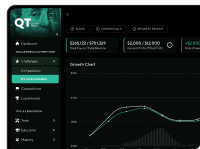Introduction to Financial Markets: Comprehensive Guide | Quant Tekel
Explore the essentials of financial markets with Quant Tekel. Learn about centralised and decentralised markets, key exchanges, and trading dynamics.
Introduction to Financial Markets with Quant Tekel
Financial markets and institutions encompass a wide array of components and concepts. Quant Tekel offers a comprehensive guide to help you understand both fundamental and advanced aspects of these markets.
Understanding Financial Markets and Institutions
Financial markets are platforms where various financial assets are exchanged. These include foreign currencies, stocks, bonds, and commodities. A critical segment of financial markets is the capital market, where investors and issuers meet. Issuers raise funds for their businesses, while investors seek returns on investment (ROI). The market operates like a double-sided auction, where the final price reflects supply and demand dynamics.
Major Centralised Exchanges Worldwide
- NYSE (New York Stock Exchange) – The largest exchange globally by market value.
- NASDAQ – Known for its electronic trading system and technology stocks.
- Euronext – A major European exchange.
- FWB (Frankfurt Stock Exchange) – Germany’s leading exchange.
- LSE (London Stock Exchange) – A key financial hub in the UK.
- TSE (Tokyo Stock Exchange) – Japan’s primary exchange.
These centralised exchanges facilitate transactions between buyers and sellers, determining prices and clearing trades at a central location.
Decentralised Markets
Decentralisation involves distributing decision-making powers away from central authorities. Decentralised exchanges, unlike their centralised counterparts, operate without a central point of control. Cryptocurrencies, such as Bitcoin, exemplify decentralisation by enabling peer-to-peer transactions without central oversight.
Key Features of Decentralised Exchanges
- Users retain control over their resources.
- Lack of a central server reduces vulnerability to cyber attacks.
- Operate independently of individual control.
- Prioritise client privacy without extensive registration processes.
Understanding OTC (Over-the-Counter) Markets
OTC markets are decentralised, allowing participants to trade directly through various communication channels. These markets are less transparent and regulated compared to centralised exchanges and are primarily used for trading bonds, currencies, derivatives, and structured products.
Forex Market Overview
The forex market is the largest and most liquid financial market, operating 24/5 through global trading sessions. With an average daily trading volume of $7.5 trillion (2022 data), it surpasses global stock markets. Forex operates as an OTC market, connecting dealers and traders without a central trading floor.
Centralised vs. Decentralised Markets for Retail Traders
- Centralised Markets: Feature standardisation, regulation, transparency, and uniform pricing but require significant capital.
Decentralised Markets: Offer varied conditions and pricing, with competitive broker environments leading to lower trading costs and leverage opportunities.




